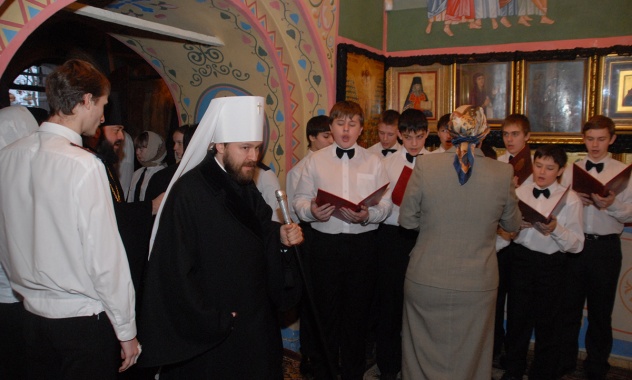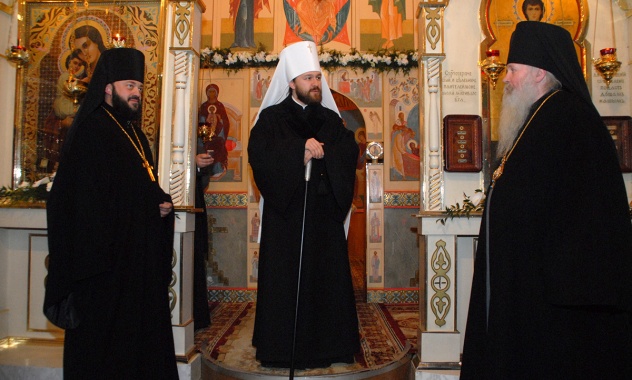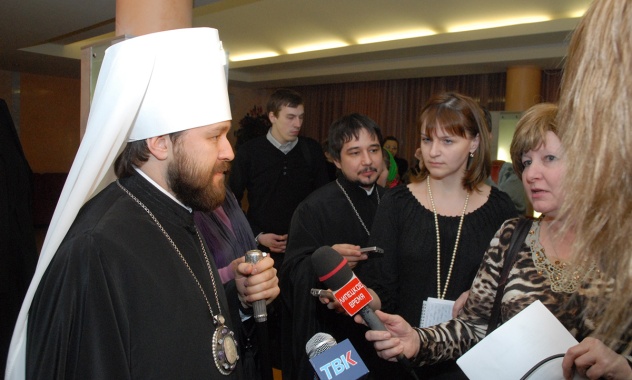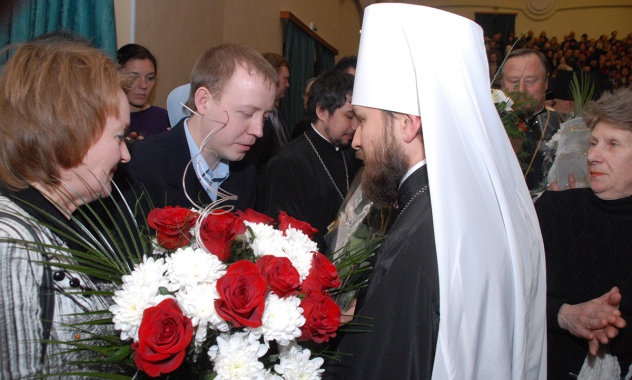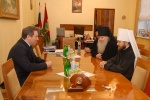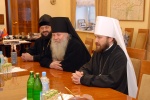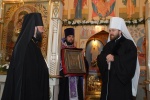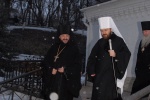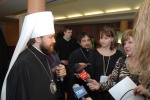Metropolitan Hilarion’s visit to Lipetsk
During his visit to the diocese of Lipetsk on March 12, 2010, Metropolitan Hilarion of Volokolamsk, chairman of the Moscow Patriarchate’s department for external church relations, accompanied by Bishop Nikon of Lipetsk and Yelets, met with Lipetsk Governor O. Korolev.
Metropolitan Hilarion thanked the governor for his long-standing assistance to the Lipetsk diocese of the Russian Orthodox Church, saying, ‘the restoration of churches and defiled holy places is a common task for both the Church and the state and it is gratifying that the church and state authorities do it together in the region entrusted to your care’.
They discussed demographical and ethical problems and challenges to be met by all those who are not indifferent to the future of the country.
‘We have experienced very difficult times, and we can state with joy that the pendulum of society’s spiritual and moral condition has reversed thanks primarily to the Church’, the governor said.
Then the DECR chairman visited the Lipetsk Monastery of the Dormition. Welcoming him, the father superior, Hegumen Mitrofan (Shkurin), thanked Metropolitan Hilarion for ‘the joy and consolation you give us by your archpastoral visit to the oldest monastery in Lipetsk as a continuation of a long train of renowned authors, statesmen, governors, princes and tsars who used to come here, and the great saints of the Russian land, such as St. Tikhon, St. Mitrofan, St. Pitirim of Tambov, who used to take pastoral care of this land. We are pleased by the fact that we receive your archpastoral blessing in these Lenten days’.
Metropolitan Hilarion venerated the monastery’s icons and gave an admonition to the young people who gathered in the church for the occasion, saying,
I would like to greet you all and convey to you a blessing from His Holiness Patriarch Kirill of Moscow and All Russia. I wish that with God’s help you may always be good Christians. I will remind you of His Holiness the Patriarch’s words that to be a Christian means not only to come to church, to observe rites and participate in the Sacraments, but also to live Christianly.
Each of us is given life so that we may live it worthily. And to do it, we should live up Christian spiritual and moral ideals in concrete works and actions and do it from an early age. Whenever we are faced with a choice, we should ask ourselves what Christ would do in the circumstances. Whenever we can or cannot do evil to anybody, we should recall what the Gospel teaches us to do. When we learn to refer our everyday life to the Gospel, when we learn to think before acting and to repent of wrong doing and to try not to repeat our evil deeds, then we will really be good Christians.
As a token of his visit, the monastery brethren gave Metropolitan Hilarion an icon of the martyrs of Vilnius at whose relics he took monastic vows in the Monastery of the Holy Spirit in Vilnius.
In the evening, the Voronezh symphony orchestra and the Lipetsk chamber choir performed Metropolitan Hilarion’s Passions According to St. Matthews at the regional culture and folk center.
Addressing the audience, which included regional dignitaries, city officials, clergy, people from church and public organizations and numerous music lovers, Archbishop Ionafan of Tulchin and Bratslav said:
The history of Russian Orthodox music knows of many religious composers who belonged to various estates – bishops and priests as well as lay people. Among them are those whose names are unknown and those whose names are dominant today. Suffice it to remember such prominent composers as Kastalsky, Tchaikovsky, Chesnokov, Grechaninov and many others including our contemporaries. In the pleiad of remarkable authors of religious music I would like to make a special mention of His Eminence Hilarion and his creative work. He has flared up like a bright comet; his Passions According to St. Matthews, Christmas Oratorio, Divine Liturgy, All-Night Vigil and other compositions have made a great impression and astounded audiences not only in Russia.
Having shared his own emotional experience of Metropolitan Hilarion’s music, Archbishop Ionafan continued:
The atmosphere of spiritual experience in this musical work tells us that we have something to live for, that God opens for us unbounded horizons of life which has no end on earth. Wherever His Eminence’s remarkable music is played, be it in Russia, or Ukraine, or other countries in the near or far abroad, it leaves nobody indifferent. Certainly, there may be different appraisals as there were difference responses to Tchaikovsky’s music in his time, but one thing is certain: we are contemporaries of an outstanding talent, a star of the first magnitude in the sky of religious musical culture not only in Russia but throughout the Orthodox world.
He reminded the audience of the words of Metropolitan Hilarion who said on several occasions that he composed Passions According to St. Matthews with the purpose to bring infrequent church-goers who are far from church culture closer to the Church, and noted,
This musical work is a bridge connecting the Church and secular society… It is not liturgical music but it helps to introduce the modern listener to special musical forms of spiritual hymns. I cordially thank Metropolitan Hilarion for his feat of carrying the archpastoral cross and serving the musical art of Russia and the entire Orthodox world.
The audience warmly acclaimed the performance of Passions According to St. Matthews.
After the concert Metropolitan Hilarion had a talk with the local press.
DECR Communication Service










